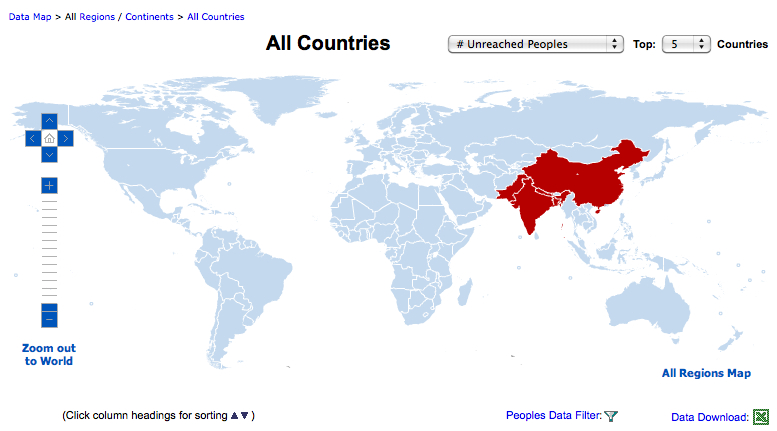
Today, we are featuring an interview with the Joshua Project. Chances are, you’ve heard about Joshua Project, and maybe seen a link on a blog to the “Unreached People of the Day.” If you’re involved in missions in any way, you may have profited from their vast collation of demographics data from around the globe. If you have a passion for the spread of the gospel, your heart has been warmed if you’ve ever visited their site.
And if you have no idea what Joshua Project is, you’re in for a treat as you read on.
 We spoke with Dan Scribner to get a glimpse at this fascinating ministry and what goes on behind the scenes. Although Joshua Projects functions on a skeleton crew, a tiny budget, and a little office, their impact is eternal in its duration, global in its scale, and infinitely important in the priority of God’s Kingdom. Dan Scribner answers complex questions, tackles thorny issues, and offers fascinating insights into missions today.
We spoke with Dan Scribner to get a glimpse at this fascinating ministry and what goes on behind the scenes. Although Joshua Projects functions on a skeleton crew, a tiny budget, and a little office, their impact is eternal in its duration, global in its scale, and infinitely important in the priority of God’s Kingdom. Dan Scribner answers complex questions, tackles thorny issues, and offers fascinating insights into missions today.
Can you give us a little history on when Joshua Project got started and why?
Joshua Project was started in 1995 as part of the AD2000 & Beyond Movement as an effort to focus global attention on unreached people groups. An initial list of about 1,800 unreached people groups was developed by a committee of editors including Patrick Johnstone of Operation World, Frank Jansen of the Adopt-A-People Clearinghouse, Ron Rowland of SIL and John Gilbert of the IMB Global Research Office. Several of these men have since gone to be with the Lord. The idea was to produce a manageable list of the largest unreached ethno-linguist people groups that would help bring focus to the unfinished task of the Great Commission. (For more information, check out http://www.joshuaproject.net/joshua-project.php)
How is the Joshua Project supported?
Joshua Project as an organization is supported through general donations. We do not do any organizational fund-raising and somehow through a few regular donors and unsolicited gifts via the website the Lord covers our monthly expenses. We operate on literally a couple hundred dollars per month total.
Who all works at Joshua Project?
The Joshua Project team is comprised of three people. Two raise their own support through family, friends, churches, etc. One is a full-time retired volunteer. The credit for the data Joshua Project presents however really should be given to a network of missions/people group researchers around the world that graciously contribute their work to the overall pool of information Joshua Project simply attempts to put all the data together into a comprehensive global picture.
Each of us at Joshua Project has a somewhat different role. One person manages all the data. We continually get updates from field missionaries, other researchers and contacts. This includes keeping all the major resources up-to-date such as population and religious percentage figures, Bible and Jesus Film availability, cross-referencing with other global peoples lists, etc. Another person manages the people profile content such as photos, maps and text. They are also involved in Spanish translation and Joshua Project communications. Another person handles web development and administration. All of us respond to numerous (!!) daily email requests regarding questions, clarifications, data, web resources etc.
Good question! My answer to the next question might be helpful. This is not a shortcoming, but an movement of God that I think the Western church is mainly ignorant of, and that is the rise of the Global South and their mission vision. For example, in the last ten years for every one new believer in North America and Europe there have been nearly 30 new believers in developing countries like Nigeria, Brazil, India and China. Today there are more Christ-followers in China than in the US. For more info, see the “Let the Nations Be Glad” or “Signs of the Times” or “Status of World Evangelization” PowerPoints found here.
The Church in many of these developing countries has a growing burden for the Great Commission and unreached peoples. A tiny indicator of this is that more than half the Joshua Project website traffic is from countries outside North America. Many of the inquiries and requests for data these days are from mission agencies located outside the US.
Very true and increasingly so as the West is rapidly moving more and more to a post-Christian, been-there-done-that, almost anti-Christian culture. Yet, at the same time the Gospel is fully available in the West. If someone wants a Bible or to listen to a Gospel message or go to a solid church they have the opportunity. However, there are millions of individuals living in thousands of people groups that have few if any followers of Christ, no Christian heritage, minimal if any access to a Bible or Gospel materials in their language, no local church and no outreach in their midst. Close to 90% of all Christian missionaries are directed at people groups that are already nominally Christian. Less than 5% of all Christian missions, yes MISSIONS, is directed at the unreached. In a way it is kind of like the parable of the 1 and the 99 sheep but backwards. 99 of the sheep are missing but the shepherd is spending time taking care of the one rather than looking for the 99.
- First, has God given you a passion for a particular unreached people group? A particular part of the world? Or particular focus such as Muslims or Hindus? If so, follow that fully! If not, consider yourself called to the unreached. Pick out an unreached people group and begin praying for them. Ask the Lord to develop a burden in you for that group. The webpage found here allows you to enter your own criteria to find specific people groups.
- Second, does your local church have a particular missions/people group outreach focus. If so, try aligning yourself with that. Having a similar unreached missions focus with your local church helps raise up vision, prayer and supporting partners and potential team members.
- Third, is there a concentration of a particular ethnic group living somewhere near you? Maybe there are international students in your area, or a concentration of Southeast Asian ethnicities in your city, etc. Try reaching out to them right here in the US. This is good practice before moving to a whole different culture and trying to minister. It is also very strategic as internationals visiting the US are often more open to the Gospel than when they are living in their home countries.
- Fourthly, connect with a good unreached people focused mission sending agency. In our independent minded culture (which can be very good and also not so good) there is a tendency today to by-pass mission agencies, particularly in large churches. Mission agencies often have invaluable experience, training, best practices and expertise developed over decades of ministry that can help the potential missionary avoid common pitfalls, cultural mistakes and burnout.
It is a balance. One without the other seems pretty hollow. Proclamation without meeting physical needs flies in the face of James 2:16 and Matt 25:31-46. At the same time, humanitarian aid without addressing eternal salvation issues is incredibly neglectful. So both are critical. I think humanitarian aid creates the platform for proclamation. It seems the pendulum tends to swing in Christian missions between proclamation and humanitarian aid. For example in the early 1900s the liberal church embraced humanitarian aid and really downplayed / ignored proclamation. In response conservative Evangelicals embraced proclamation and tended to minimize humanitarian aid to avoid the label of “liberal.” Today the pendulum is definitely swinging toward humanitarian aid and wonderfully so. Yet I would hope it does not swing too far and proclamation / church planting be shifted to the distant background. Humanitarian aid can be done by non-Christians, but eternal destiny issues can only properly be the work of Christians.
What is your perspective on giving money to national missionaries, rather than sending people (i.e., American missionaries) ourselves?
“The West Is Not Done in Sending Missionaries. This is a great cause for Christians to rejoice in the sovereign grace of God. But what it does not mean is that the day of sending missionaries from our churches in the West is over. That would be a tragic misunderstanding of the situation. Partnership in mission with the Global South does not mean that all the unreached peoples of the world can be reached by people who are in the Global South. Don´t buy into the idea that we should send our money, not our people. That would sound very much like: ‘Let them shed their blood, not ours; we´ll just send money’ “
http://www.desiringgod.org/resource-library/sermons/the-legacy-of-antioch
This page for example shows the top ten countries by number of unreached people groups. Notice how South Asia (India, Pakistan, Nepal and Bangladesh) stands out. The columns of data below are sorted accordingly. Change the sort to % of People Unreached (descending) and notice how Pakistan, Afghanistan, Nepal and Bhutan are now at the top. Change the sort again to % Population living in Unreached People Groups (descending) and notice how North Korea and several North African countries come to the top. Sorting by Persecution ranking (ascending) to see the countries where believers are most persecuted. All these are different ways of looking at the unreached / unfinished task from various perspectives.
(Dan Scribner isn’t merely a number-crunching web guru with an interest in missions. He’s also a voracious reader of all things missions. I asked him, “Who are some of your missions heroes or favorite books?)
Missionary heroes would include:
- Hudson Taylor: God’s Man in China
- To the Golden Shore: The Life of Adoniram Judson
- James Frasier – “Beyond the Ranges / Mountain Rain”
- William Carey by Mary Drewery
- William Borden – “The Life that Counts”
- Jonathan Edwards – “Jonathan Edwards: A New Biography” by Murray
- David Brainerd = “Life and Diary of David Brainerd” by Edwards
A couple favorite missions books (among many others):
- Let the Nations Be Glad – Piper
- Swans are Not Silent Series – Piper
- Green Leaf in Drought Time – Matthews
- The Heavenly Man – Brother Yun
- Shadow of the Almighty – Elliot
- Vanya – Myrna Grant
- List of ideas for individuals at: http://www.joshuaproject.net/mission-pathways-individuals.php
- And for churches at: http://www.joshuaproject.net/mission-pathways-churches.php
Everything Joshua Project offers is free. Some resources include:
- Great Commission overview Powerpoints: http://www.joshuaproject.net/great-commission-powerpoints.php
- iPhone / iTouch Unreached Peoples application: http://www.joshuaproject.net/mobile.php
- Unreached Peoples Prayer Cards in various sets and languages: http://www.joshuaproject.net/prayer-cards.php
- Bulletin Inserts: http://www.joshuaproject.net/bulletin-inserts.php
- Online Audio NT in 400 languages: http://www.joshuaproject.net/nt-audio.php
- Unreached People of the Day as web widget, Facebook app or by email: http://www.unreachedoftheday.org/
- Unreached maps
- Unreached articles
- Unreached Videos
- Unreached Downloads
I would also recommend any John Piper messages on missions as very inspiring and helpful in spreading missions / unreached peoples vision.
I want to help out! What can I do?
We list a series of staff or volunteer opportunities at:
http://www.joshuaproject.net/opportunities.php

